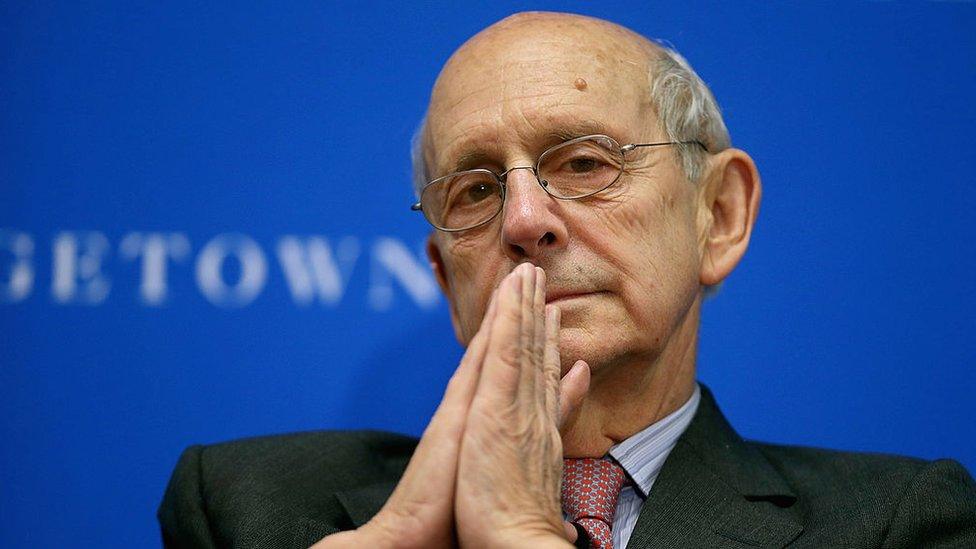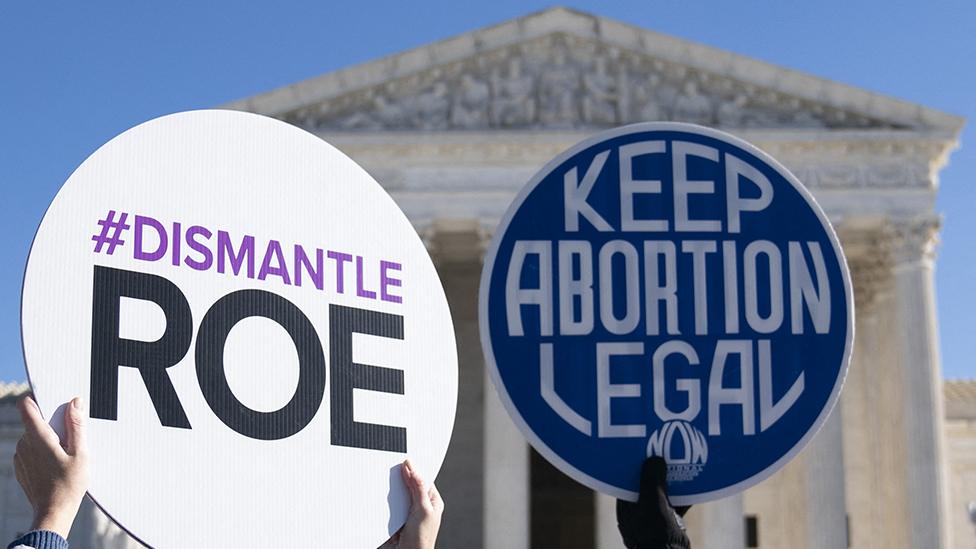US Supreme Court Justice Stephen Breyer to retire
- Published

Justice Stephen Breyer in 2014
Liberal US Supreme Court Justice Stephen Breyer will retire later this year after nearly three decades on the bench.
His decision ensures President Joe Biden will have an opportunity to nominate a successor who could serve for decades.
But Justice Breyer's replacement will not shift the court's current 6-3 conservative majority.
It comes as the court considers several hot-button issues.
Justice Breyer is expected to retire at the end of the current Supreme Court term in June.
The court plays a key role in American life and is often the final word on highly contentious laws, disputes between states and the federal government, and final appeals to stay executions.
Each of the nine judges - known as justices - serves a lifetime appointment after being nominated by the president and approved by the Senate.
Democrats have been pressuring Justice Breyer - who, at 83, is the oldest member of the bench - to retire so they can fill the seat with someone younger while they control the White House and Senate.
The last Supreme Court vacancy came in 2020, when liberal Justice Ruth Bader Ginsburg died at age 87. Former President Donald Trump was able to appoint her successor, Justice Amy Coney Barrett, less than two months before the US presidential election.
Progressives like New York congresswoman Alexandria Ocasio-Cortez have been publicly calling for Justice Breyer to step down.
A van hired by the group Demand Justice and carrying the words "Breyer Retire" has also been seen driving around Washington.
According to multiple sources, Justice Breyer was "upset" over the leaked news because he "was not planning to announce his retirement today".

Mr Biden has previously pledged to nominate a black woman to the court for the first time if a vacancy opens.
Only two African Americans - both men - have ever served on the court: Justice Thurgood Marshall from 1967 to 1991 and his successor Justice Clarence Thomas, who now becomes the oldest member on the bench at age 73.
On Wednesday, White House press secretary Jen Psaki said the president would honour his commitment.
Ketanji Brown Jackson, 51, a former law clerk to Mr Breyer, is believed to be the top contender for the job.
Ms Jackson was confirmed last June to a seat on the US Circuit Court of Appeals for the District of Columbia, in which she succeeded current Attorney General Merrick Garland.
Leondra Kruger, 45, who serves on the California Supreme Court, is another possibility.
Another tipped contender is J Michelle Childs, a judge on South Carolina's federal court.
In a statement, the top Democrat in the Senate called the outgoing Justice Breyer "a model jurist".
"President Biden's nominee will receive a prompt hearing in the Senate Judiciary Committee, and will be considered and confirmed by the full United States Senate with all deliberate speed," Senator Chuck Schumer said.

A welcome respite for Biden

Anxious liberals who have endured a string of Supreme Court disappointments in recent years can exhale, at least for a moment. Justice Breyer is going to retire, giving Joe Biden the chance to name a replacement that can be confirmed while Democrats control the US Senate.
The move won't alter the conservative tilt of the high court, which Donald Trump cemented with three appointments in four years. It will, however, ensure Justice Breyer will be replaced by someone who could conceivably hold the seat for decades.
The confirmation process to fill the vacancy should provide a welcome respite for a president who has been buffeted by legislative defeats and bad domestic and international news in recent months.
If all goes smoothly - admittedly, no guarantee - the choice has the potential to remind liberals why having a Democrat in the White House is important and culminate in a Senate vote with a rare (for this president) successful outcome.

A San Francisco native and Harvard Law graduate, Justice Breyer was appointed to his position in 1994 by President Bill Clinton.
Over 27 years, he wrote more than 500 opinions and was among the high court's most consistent liberal voices, delivering notable rulings on topics like gay marriage, healthcare, voting rights and the death penalty.
Known for his collegiality and prolific penmanship, he has expressed concern in recent years over the increasing politicisation of the court, telling an audience in 2021 that "it is wrong to think of the court as another political institution".
In 1967, Justice Breyer married Joanna Hare, the daughter of John Hugh Hare, a former chairman of the British Conservative Party and the First Viscount of Blakenham. The couple both attended Oxford University as undergraduates.
Related topics
- Published24 January 2022

- Published3 May 2022

- Published1 November 2021
